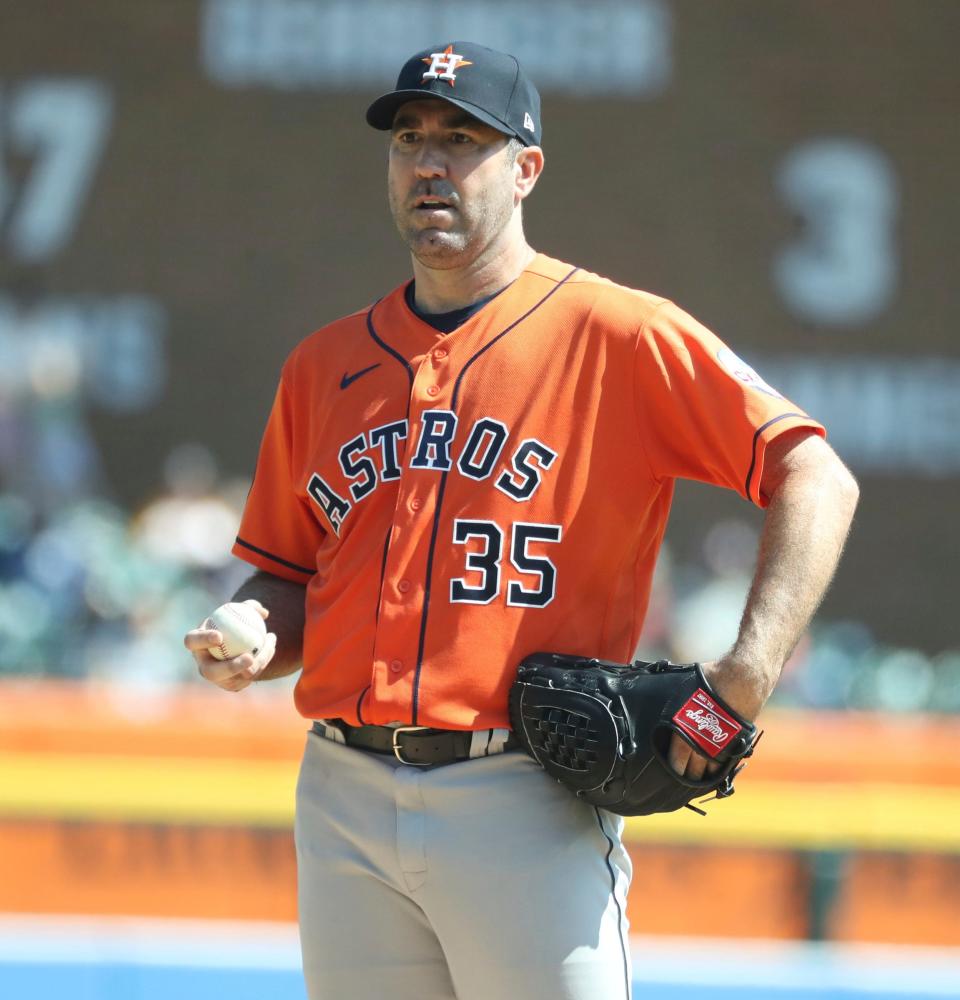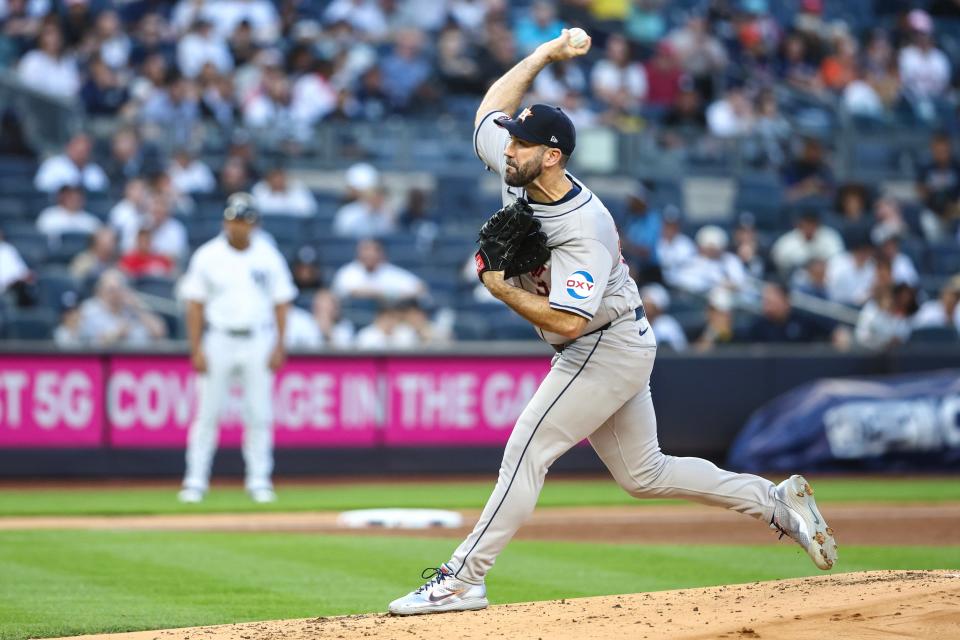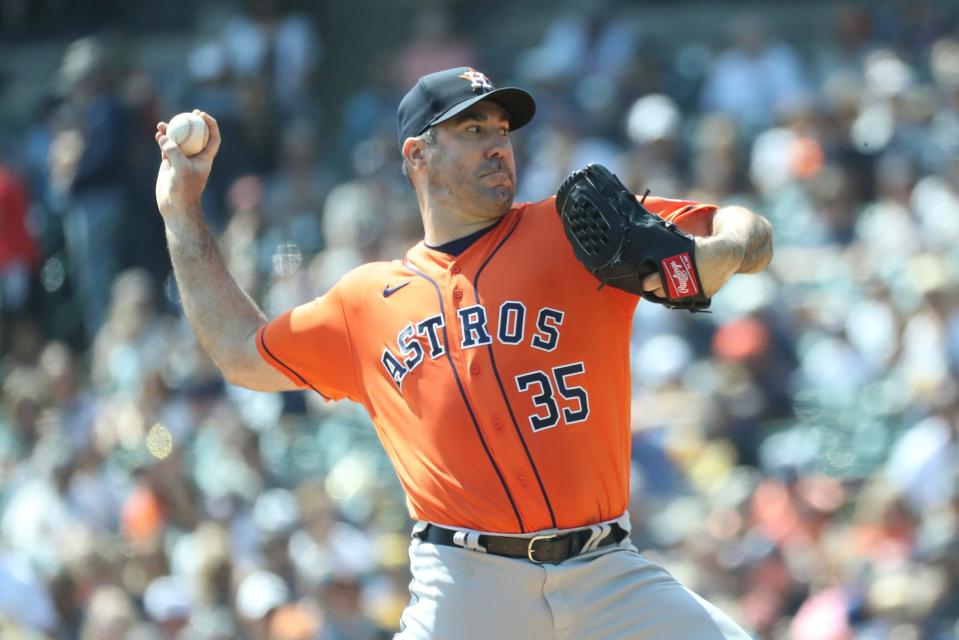Justin Verlander says 'fate' will decide if he returns to Detroit Tigers before retirement
Justin Verlander can't help but think about a reunion.
"Honestly, and this isn't just some bullshit answer," the Houston Astros right-hander said Friday, "I take my career as it comes to me and try to make decisions at the time that they're in front of me. I try not to get too far ahead or behind, just try to be present and try to be as good as I possibly can for as long as I can."
He paused.
"Obviously, I think about it," Verlander continued. "You come back here, and obviously, it has to be on your mind. But as far as signing with the Tigers and coming back here, that's fate. I don't know. That's something that's out of my control. It's an unanswerable question."

Verlander, a near-certain Hall of Famer in his 19th MLB season, can't promise a return to the Detroit Tigers before he retires, but he said he always thinks about wearing the Old English "D" again when he comes back to Comerica Park, the place he called home for the first 13 seasons.
This time, Verlander is scheduled to pitch Sunday for the Astros against the Tigers at Comerica Park.
"It'll always feel a little special," Verlander said, leaning back in the chair in front of his locker in the visitor's clubhouse. "The more removed you get, the less people you know on the other side, and that kind of changes it a little bit, but I think it'll always be special for me to come back here."
MORE ON THIS: Inside Justin Verlander's 2011 MVP season & his thoughts on a reunion with Tigers
Verlander, who pitched for the Tigers from 2005-17, is in his age-41 season as a member of the Astros. It's the final season of a two-year, $86.7 million contract, which includes a full no-trade clause; but the most important detail is that the contract contains a $35 million vesting option for the 2025 season that is triggered if he throws 140 innings in the 2024 season.
Right now, Verlander is on pace for roughly 150 innings.
A shoulder injury delayed his start to the 2024 campaign. He didn't make his first start for the Astros until April 19. After four starts, he has a 4.43 ERA with 10 walks and 15 strikeouts across 22⅔ innings.
"I got some mechanical issues that became pretty prevalent to me," Verlander said, "but physically, I feel good. I'm still putting in all the work to go out there and throw. It's still working. My arm feels good."
He has put exactly 3,347⅔ innings on his right arm in his MLB career.
Verlander, drafted No. 2 overall by the Tigers in 2004, logged 2,511 of those innings as a member of the Tigers from 2005-17, posting a 3.49 ERA with 2,373 strikeouts across 380 games. Along the way, he won the 2006 American League Rookie of the Year, the 2011 AL Cy Young and the 2011 AL MVP with the Tigers, while racking up six of his nine All-Star selections.
The Tigers traded Verlander to the Astros — for Jake Rogers, Daz Cameron and Franklin Perez — in late August 2017, and since then, Verlander has won two more AL Cy Young awards, plus two World Series championships.
But Detroit is where Verlander developed as a pitcher.
This is the city where he grew up.
"I learned a lot," Verlander said. "Before analytics, that was one of the things that I'm thankful for is having the opportunity to pitch back then, and when I say pitch, I mean, just go figure it out. Figure out how to be successful. Figure out how to work through a lineup a bunch of times. Read swings. Do all that. It's something that I still lean on heavily, even though I have all this wealth of information, as far as analytics go. I feel like I can quickly adapt away from stuff or towards different game plans just based on what I'm seeing and feeling. That was something I just had to learn."

RESPECT: Former Tigers teammates Miguel Cabrera, Justin Verlander show respect in finale
Verlander remembers being told his starts resembled bullpen sessions — and not in a good way.
He wasn't following a pitch-by-pitch plan.
"I had somebody tell me one time, and it makes sense now," Verlander said, "but they said it looked like I was throwing a bullpen when I was pitching. What they said was, if I threw a pitch I didn't like, instead of reading the pitch, reading what the hitters reaction to the pitch was and adjusting off that, I was just pissed that I didn't throw a good pitch, so I would throw it again, for no other reason than like, '(Expletive), that was horrible, I can do better than that.' It's really true. I just have great stuff, but I learned how to pitch as I went along."
[ MUST LISTEN: Make "Days of Roar" your go-to Detroit Tigers podcast, available anywhere you listen to podcasts (Apple, Spotify) ]
Verlander feels like he's still learning as a pitcher, even as he nears two full decades.
"In any walk of life, I think almost anybody can relate to this," Verlander said. "If you've got 30 years of experience versus a few years of experience, what you learn throughout your tenure is you make mistakes — everybody makes mistakes — and learn from them. That's the only way to be."
Over the years, Verlander has evolved as a pitcher — as has the sport.
A game that used to be evaluated by traditional stats, such as batting average and pitcher wins, is now dominated by advanced analytics. He remembers looking at game film to analyze his mechanics earlier in his career, but these days, high-speed cameras capture three-dimensional biomechanical data on every single pitch.
He embraces the analytics but trusts his instincts.
"There's positives and negatives to everything," Verlander said. "There's a lot of information now. One of the things that it detracts from is guys figuring out what they do really well. You have analytics to tell you your pitch breaks do really well, but guys fail to have the hitter tell them what they do really well. They rely a lot on the numbers and think, if you throw a certain pitch shape, that's going to lend to success, and sometimes you watch them perform in the game, and it's the hitter saying, I don't care what the analysts say, I'm hitting that pitch, or I'm swinging at it pretty well. I think you lose a little feel, or you can. Not everybody, obviously. But at the same time, that information given to you on a platter is extremely valuable if you use it right. It's like anything. You got to walk the line. You got to remember the baseball side of it but use the analytics to your advantage, whether it's scouting or pitch shaping or whatever. It's a blessing, as long as you use it right."

THE CAP: Tigers icon Justin Verlander coy about Hall of Fame cap, but here's why it's not his decision
In 2024, Verlander has been working through mechanical adjustments since returning from the shoulder injury. He believes he needs to be more deceptive to generate more swings and misses.
Verlander is coming off one of his worst starts in a long time, allowing seven runs on eight hits and three walks with two strikeouts in five innings against the New York Yankees, surrendering three home runs. He had better results in his first three starts against the Washington Nationals, Chicago Cubs and Cleveland Guardians.
"I had an inkling that I wasn't quite right," Verlander said. "The lineups I pitched against didn't know me as intimately as the Yankees, and maybe weren't as veteran, so their approach wasn't quite as refined. It points out that I wasn't right. It lets me know I got work to do. ... When I'm pitching well, I have much better control and deception."
Now, Verlander is preparing to face the Tigers.
He hopes to bounce back against the team he thinks about rejoining.
"I'm always rooting for the guys, the organization," Verlander said, "except when we play them."
Contact Evan Petzold at epetzold@freepress.com or follow him @EvanPetzold.
Listen to our weekly Tigers show "Days of Roar" every Monday afternoon on demand at freep.com, Apple, Spotify or wherever you listen to podcasts. And catch all of our podcasts and daily voice briefing at freep.com/podcasts.
This article originally appeared on Detroit Free Press: Justin Verlander says 'fate' will decide on return to Detroit Tigers

